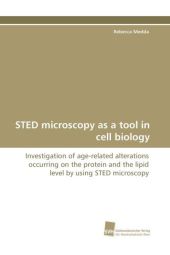 Neuerscheinungen 2010Stand: 2020-01-07 |
Schnellsuche
ISBN/Stichwort/Autor
|
Herderstraße 10
10625 Berlin
Tel.: 030 315 714 16
Fax 030 315 714 14
info@buchspektrum.de |

Rebecca Medda
STED microscopy as a tool in cell biology
Investigation of age-related alterations occurring on the protein and the lipid level by using STED microscopy
2010. 180 S. 220 mm
Verlag/Jahr: SÜDWESTDEUTSCHER VERLAG FÜR HOCHSCHULSCHRIFTEN 2010
ISBN: 3-8381-1538-4 (3838115384)
Neue ISBN: 978-3-8381-1538-2 (9783838115382)
Preis und Lieferzeit: Bitte klicken
This thesis reports on two applications of the STED (stimulated emission depletion) principle investigating alterations on the protein and lipid level. One hallmark of age-related neurodegenerative diseases is the abnormal post-translationally hyperphosphorylation of proteins. Here, the interplay of two main post-translational modifications of neurofilaments was investigated. The organization pattern of these modifications that were not resolvable by conventional light microscopy could finally be displayed with the about 10-times higher resolution of STED microscopy. Furthermore this technique allowed the detection of early alterations in these patterns in dependence of the provided glucose amount. Another effect occurring during aging is the change in the plasma membrane´s fluidity. This thesis reports on the investigation of the diffusion characteristics of different phospholipids using STED-FCS in living cells. It was shown that sphingolipids, in contrast to phosphoglycerolipids, were trapped on spatial scales below 30 nm, which could not be examined by confocal microscopy. Upon changing the endogenous cholesterol level this hindered diffusion could be reversibly abolished.
Rebecca Medda studied Biology at the Ruprecht-Karls University ofHeidelberg. She joined Stefan Hell´s department ofNanoBiophotonics at the MPI for biophysical chemistry andreceived her PhD in 2009.


